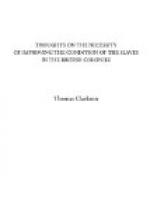And as the right to slaves, because they were born slaves, cannot be defended either upon the principles of reason or of justice, so this right absolutely falls to pieces, when we come to try it by the touchstone of the Christian religion. Every man who is born into the world, whether he be white or whether he be black, is born, according to Christian notions, a free agent and an accountable creature. This is the Scriptural law of his nature as a human bring. He is born under this law, and he continues under it during his life. Now the West Indian slavery is of such an arbitrary nature, that it may be termed proper or absolute. The dominion attached to it is a despotism without control; a despotism, which keeps up its authority by terror only. The subjects of it must do, and this instantaneously, whatever their master orders them to do, whether it be right or wrong. His will, and his will alone, is their law. If the wife of a slave were ordered by a master to submit herself to his lusts, and therefore to commit adultery, or if her husband were ordered to steal any thing for him, and therefore to commit theft, I have no conception that either the one or the other would dare to disobey his commands. “The whip, the shackles, the dungeon,” says Mr. Steele before mentioned, “are at all times in his power, whether it be to gratify his lust, or display his authority[3].” Now if the master has the power, a just, and moral power, to make his slaves do what he orders them to do, even




